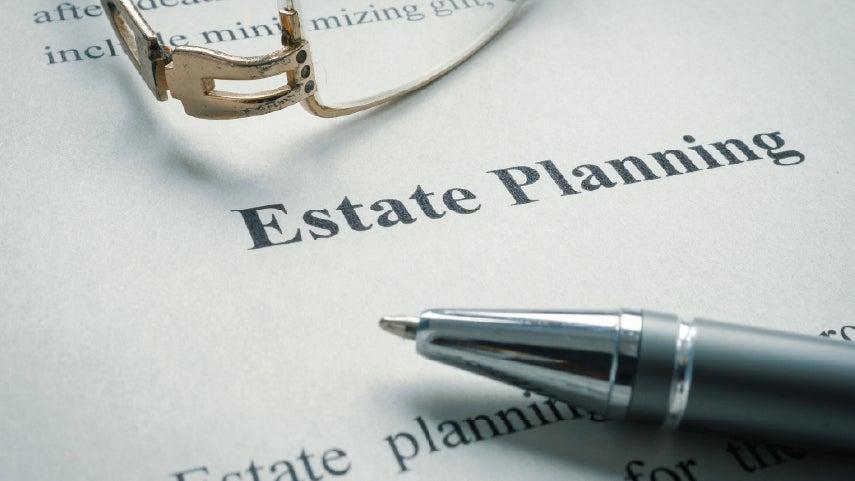
Related Topics
You want to make sure your valued possessions—and the people and pets you love—will be cared for exactly as you wish after you die. A will can help ensure you’re in control of how your legacy is passed down. But hiring a qualified lawyer to draft one can be time-consuming and costly.
Here’s the upside: You can create a perfectly legal will on your own in most states. Below, we explain how to do it, what makes a will valid, and when it makes sense to seek the help of a professional.
Your two basic options for drafting a will are:
- A handwritten (holographic) will, which is accepted in many states. It simply has to be signed, dated, and clearly written in your own handwriting.
- A typed will, which is created with an online template or through an online will maker service. You just have to be sure you follow witnessing rules and other state guidelines. Check out our top picks for the best online will maker.
For many people with modest estates, a do-it-yourself (DIY) will is a budget-friendly and perfectly adequate choice.
What makes a will legal without a lawyer?
Every state sets its own rules, but most share the same core requirements. A will generally must:
- Identify you: Begin with your full name and a clear statement that the document is your last will and testament.
- Name beneficiaries: List who receives what using their full legal name (for example, “My daughter, Gretchen T. Smith, will receive the house at 123 Oak Street”).
- Appoint an executor: A will executor is a person responsible for carrying out the instructions in your will, including managing assets, paying any debts, and distributing property to beneficiaries. Choose someone you trust, like a close family member or good friend.
- Include your signature and date: Sign and date the document at the end.
- Be witnessed: Usually, at least two competent adults (not beneficiaries) have to watch you sign the will and then sign it themselves. These people typically must be “disinterested” parties, meaning they don’t stand to gain anything from your will. Some states allow three witnesses. A few states (e.g., Texas and California) recognize holographic wills without witnesses—but only under specific conditions and with more risk of being challenged.
✅ Tip: In some states, a will must be notarized after it’s signed. Even if it’s not required in yours, you may want to include a self-proving affidavit (a short, notarized statement signed by you and your witnesses). This can help speed things up in probate court.
Step-by-step: How to make a will without a lawyer
Now that you know the basic anatomy of a will, you’re ready to get started creating your own. Below is the general process of drafting a will, broken down into manageable steps:
- Decide what you want your will to accomplish: Who should inherit your money, property, and valued belongings when you pass on? Do you want to include instructions for your funeral or final arrangements? Do you want to designate someone to look after your pets?
- List your assets: Write down your major possessions. This should include physical assets such your home, vehicles, and family heirlooms as well as financial assets like bank and retirement accounts. Be sure to include details of each asset (e.g., “my home on 45 Summer Street located in Anytown in Anystate”).
- Choose your beneficiaries: Decide who receives what from your estate. You can name people, charities, or a mix of both. Be as specific as possible (e.g., “My grandson, Daniel Xavier, born April 7, 2007, will receive my red 1967 Chevy Corvette.”).
- Name an executor: Choose someone who is organized and trustworthy, whether it’s your spouse, adult child, or close friend or relative. ✅ Tip: Always ask that person first, since serving as executor of someone’s will can be time-consuming.
- Use a template or online will maker: Download a state-specific will template or use a reputable online will maker service. Answer the prompts and insert your information, and the software will format everything properly. Print a final copy for your records.
- Sign the will and have people witness it: Sign the document in ink, and then have your witnesses sign in your presence (and each other’s). Be sure to follow your state’s exact witness rules pertaining to number of witnesses, age, and whether they can inherit from your estate.
- Store the document safely: Place the original will document in a fire-safe box, home safe, or safe-deposit box. Tell your executor where to find it and consider giving copies to trusted family members. You can also use a digital vault; just make sure your executor and relatives have the security information (i.e., username/password) to access it.
How to make a living will without a lawyer
Unlike a traditional will, a living will does not distribute assets. Instead, it states your medical wishes if you become unable to speak for yourself due to head trauma, late-stage dementia, stroke, or other instances of mental incapacity.
A living will (also called an advance directive) may cover your preferences related to:
- Use of antibiotics if end of life is imminent
- Life-sustaining treatments (e.g., dialysis, ventilators)
- Artificial nutrition or hydration (feeding tubes)
- Do-not-resuscitate (DNR) orders
- Do-not-intubate (DNI) orders
To make a living will without a lawyer, you should:
- Get the right form: Find free advance directive forms in your state by contacting your State Attorney General’s Office or local Area Agency on Aging (call 1-800-677-1116 to find yours). You can also visit the American Bar Association website.
- Spell out your wishes: Write out your specific instructions. You can also name a health care
- Sign and witness: Some states require two adult witnesses, a notary, or both for a health care advance directive.
- Distribute copies: Give signed copies of your living will to your doctor, your power of attorney agent, and close family members.
✅ Tip: If you have Medicare, Part B covers advance care planning as part of your Annual Wellness Visit.
Free and low-cost tools to make a will without a lawyer
Cost shouldn’t be a barrier to smart estate planning. If you’re wondering how to make a will without a lawyer, take a look at these budget-friendly options:
- Online will-making services: Companies such as LegalZoom, Trust & Will, FreeWill, Nolo, and Rocket Lawyer offer will-making services ranging from free (for very basic documents) to around $200 for more comprehensive packages.
- State-provided forms: A handful of states—California, Texas, and others—publish statutory will templates you can fill in and sign.
- Community resources: Check with your local senior center, library, or nonprofit legal-aid group. These organizations often host free or low-cost clinics or workshops related to estate planning.
When you should consider using a lawyer
DIY will-drafting works well for many people. But you may want to seek the advice of a legal professional if:
- Your estate is complex or sizeable: Having large sums of money or investments, owning a business, or owning property in multiple states can complicate taxes and probate.
- You have special family considerations: If you want to make provisions for minor children, children with special needs, or a blended family, it’s best to consult a qualified estate planning attorney who can ensure all your bases are covered. For example, a dependent with a disability may require a special needs trust to protect their eligibility for government benefits like Supplemental Security Income and Medicaid.
- You expect family disputes: Relatives who are upset about being excluded from the will may contest it in court. A lawyer can help you draft legally airtight language that leaves no room for challenges.
- Trusts and tax optimization: If you want to minimize estate taxes or set up a living trust in addition to a will, it’s a good idea to seek professional guidance.
✅ Tip: Even if you start drafting a will on your own, you can hire an attorney to provide a flat-fee review (vs. charging by the hour). This is often less expensive than having the lawyer draft the entire document.
Protect your wishes by planning ahead
With all you have on your plate every day, drafting a will may feel like one more chore. But it’s one of the most important gifts you can give to the people you care about. And today, it’s possible to craft a valid will without ever stepping into a law office. That way, you’ll have peace of mind knowing your voice will be heard when you’re no longer here to communicate your wishes.
Frequently asked questions
Can I make a will by myself and have it be valid?
Yes. A will is legally valid as long as it follows your state’s basic rules. So if your estate is straightforward, there’s generally no need to hire an attorney.
What are the risks of making a will without a lawyer?
Making a will without a lawyer can be cost-effective, but it also comes with risks to consider beforehand:
- If the will doesn’t meet your state’s legal requirements (e.g., proper witnessing, clear language, and correct formatting), it may be challenged or deemed invalid in court.
- If there are incomplete or unclear instructions in a DIY will, it can lead to confusion or disputes among your beneficiaries.
DIY wills may overlook key details like naming an alternate executor, addressing digital assets, or accounting for estate taxes. For complex situations or larger estates, it’s wise to consult an experienced estate planning lawyer. They can also advise you on other legal matters, such as creating a power of attorney. In certain cases, skipping legal advice can ultimately create more problems than it solves.
What’s the difference between a will and a living will?
A will outlines how your property and belongings should be distributed after your death, while a living will (also called an advance directive) explains your medical wishes if you become unable to speak for yourself due to illness or injury. In other words, a will deals with what happens after you pass away, and a living will guides care decisions while you're still alive but incapacitated.


